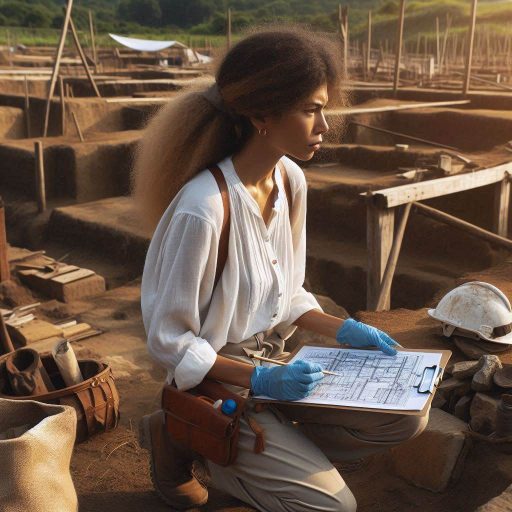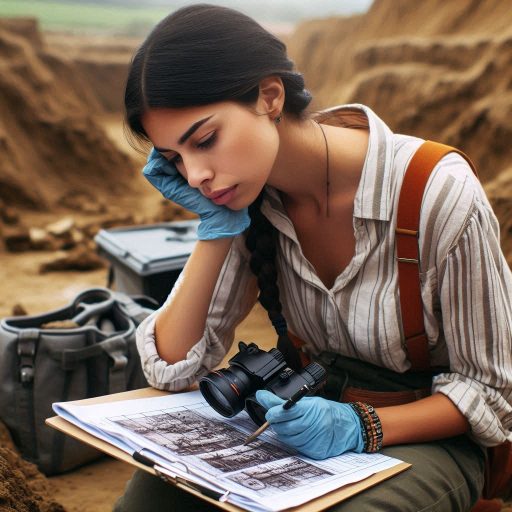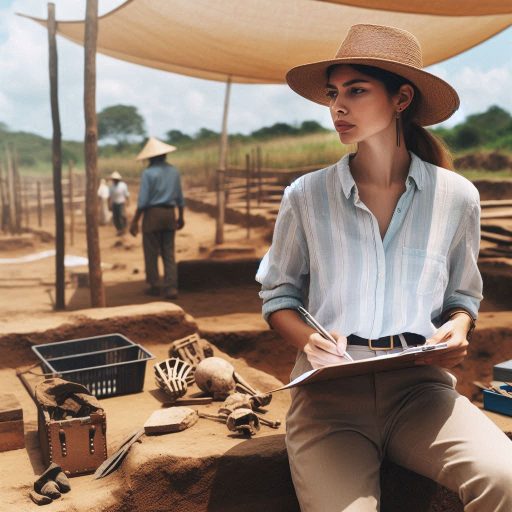Introduction
Working abroad in the field of archaeology offers a wealth of exciting and enriching opportunities for professionals eager to expand their knowledge and skills.
International experience in archaeology is not only a chance to explore the past through diverse cultural perspectives but also a unique way to gain hands-on experience in various global excavation techniques and research methodologies.
By stepping beyond the borders of your home country, you immerse yourself in new environments, face challenges that sharpen your problem-solving skills, and collaborate with professionals who bring fresh insights into the field.
The benefits of gaining international experience in archaeology are numerous.
It allows you to deepen your understanding of how different societies preserve and interpret their history.
Whether you‘re working on ancient ruins in Greece, unearthing indigenous artifacts in South America, or participating in digs in the Middle East, the diversity of archaeological sites worldwide is vast and varied.
This global exposure makes you a more versatile archaeologist, enhancing both your research capabilities and professional development.
Moreover, working abroad provides an opportunity to form valuable connections with experts and institutions from around the world.
These collaborations often lead to long-lasting partnerships and open doors to future international projects or academic opportunities.
The experience gained from working overseas is also a significant asset when applying for positions or advancing in your archaeological career, as employers often seek individuals with broad, diverse experience.
Researching International Archaeological Opportunities
The importance of researching various international archaeological opportunities
Researching international archaeological opportunities is crucial to ensure the right fit for your career goals.
Not all projects are equal, and some may not align with your specific area of interest or skill level.
Thorough research allows you to evaluate the project’s credibility, duration, and the specific region’s archaeological significance.
Understanding the logistics, such as funding, accommodations, and health and safety measures, is also key.
Without proper research, you may encounter unanticipated challenges that could hinder your professional growth or experience.
Tips on how to find and select reputable programs or projects abroad
To find reputable programs, begin by exploring trusted resources such as archaeological institutes, universities, or government agencies.
Institutions like the Archaeological Institute of America or similar regional organizations frequently list verified international opportunities.
Check the project’s duration, objectives, and the team leading it.
It’s also important to verify the project’s credibility by reviewing any published reports or academic papers associated with the site.
Ensure the opportunity aligns with your expertise, such as excavation, artifact conservation, or archaeological surveying.
Lastly, be mindful of project costs and verify whether funding or stipends are available, especially for long-term commitments.
The significance of networking within the archaeological community
Networking plays a vital role in uncovering international archaeological opportunities.
Engage with professionals at conferences, workshops, or online forums to gain insight into potential projects abroad.
Many archaeologists involved in international work are open to sharing their experiences and recommendations.
Joining professional associations, like the European Association of Archaeologists, can grant access to exclusive opportunities.
Building strong relationships with professionals not only enhances your chances of finding reputable projects but also opens doors to mentorship and collaborations.
Read: Botany Career Fairs and Networking Events
Types of Archaeological Work Available Overseas
There are various types of archaeological work abroad, catering to different skill sets and interests.
Fieldwork, research positions, and conservation projects are the most common types.
Fieldwork often involves excavation, site surveying, or artifact recovery, where you actively participate in unearthing and preserving historical artifacts.
Research positions are more academic, requiring you to study and analyze data, write reports, or collaborate with universities.
Conservation projects focus on preserving artifacts and ensuring that excavation sites maintain their historical integrity.
Each of these roles offers a unique experience and contributes significantly to the field of archaeology.
The range of locations where archaeological opportunities can be found, from Europe to Asia to Africa
Archaeological opportunities abroad are spread across continents, each offering unique historical insights.
Europe is rich in ancient Roman, Greek, and medieval sites, offering countless excavation and research opportunities.
Countries like Italy, Greece, and the United Kingdom host numerous archaeological projects exploring ancient civilizations.
In Asia, countries like China, India, and Cambodia are home to archaeological sites that delve into ancient dynasties and temples.
Africa provides another wealth of opportunities, with Egypt and its pyramids, along with other ancient civilizations like the Nubians, offering endless excavation and research possibilities.
The variety of regions ensures that archaeologists can work on projects tied to diverse historical periods and cultures.
Specific organizations or projects that offer archaeological positions overseas
Several reputable organizations offer archaeological positions abroad.
The Archaeological Institute of America (AIA) and the British School at Rome are among the top institutions facilitating projects across Europe.
In Asia, the Institute of Archaeology in Beijing and the Cambodian Archaeological Lidar Initiative provide opportunities to explore the vast ancient history of the region.
For those interested in African archaeology, the Egypt Exploration Society and the Trust for African Rock Art are key players.
These organizations not only offer fieldwork but also research positions and conservation efforts, ensuring a comprehensive range of options for archaeologists interested in working abroad.
Read: Preparing for a Botany PhD: Tips and Advice
Skills and Qualifications Needed
The essential skills and qualifications required to work in archaeology abroad
Working in archaeology abroad requires a combination of education, technical skills, and experience.
A degree in archaeology, anthropology, or a related field is often the baseline qualification.
Many overseas projects also expect specialized training in excavation techniques, artifact handling, or archaeological surveying.
Practical experience, such as internships or volunteer work at archaeological sites, is highly valuable.
Additionally, strong problem-solving skills, adaptability, and the ability to work in physically demanding environments are essential.
Since working abroad can involve unexpected challenges, having a background in cultural awareness and flexibility is also beneficial.
The importance of having experience in fieldwork, research, and data analysis
Experience in fieldwork, research, and data analysis is critical when pursuing international archaeological opportunities.
Fieldwork provides the practical skills needed for excavation, surveying, and handling artifacts in a controlled setting.
It also equips you to work in diverse environments, from deserts to jungles, which is essential when working abroad.
Research experience sharpens your ability to interpret findings, contribute to academic discussions, and publish papers on your work.
Data analysis, especially proficiency in Geographic Information Systems (GIS) and statistical methods, is increasingly valued in archaeology.
Combining fieldwork and research experience ensures you’re well-rounded and prepared for international projects.
Specific language requirements for certain countries or projects
Language skills can play a pivotal role in working on archaeological projects abroad, particularly in regions where English is not the primary language.
In countries like Italy, Greece, or Spain, knowing the local language can significantly enhance your ability to collaborate with local teams and navigate daily life.
In Latin America, fluency in Spanish or Portuguese may be required for communication with local archaeologists and communities.
For projects in Asia, particularly in countries like China, Japan, or Cambodia, language skills could improve your effectiveness in conducting research and engaging with local experts.
Learning the language specific to your destination enhances both your professional and cultural experience.
Read: Interdisciplinary Research: Botany and Other Sciences

Financial Considerations
The financial aspects of working abroad in archaeology, including cost of living, transportation, and accommodation
Working abroad in archaeology comes with several financial considerations.
The cost of living varies depending on the country, with regions like Western Europe and major cities often being more expensive than rural areas or developing countries.
Transportation costs, both for travel to the project site and daily commuting, can also add up.
Depending on the location, accommodation may range from simple lodgings at the excavation site to rentals in nearby towns.
Some archaeological projects provide housing and meals, but this is not guaranteed, so it‘s important to understand the financial commitments before accepting any offer.
Tips on how to budget effectively for an international archaeological opportunity
Effective budgeting is crucial when planning to work abroad in archaeology.
Start by researching the cost of living in your destination, including housing, food, and transportation.
Factor in additional expenses, such as medical insurance and visas.
It‘s also important to plan for emergencies or unexpected costs, like equipment or health-related issues.
Use online budgeting tools to estimate monthly expenses and compare them to your available funds.
Opt for cost-saving measures, such as shared accommodations or public transportation, to stretch your budget.
You should also inquire with the project team whether any expenses are covered, such as meals or housing, which can significantly reduce your financial burden.
Potential sources of funding or scholarships for archaeological work overseas
Several organizations offer funding or scholarships to help cover the costs of working abroad in archaeology.
The Archaeological Institute of America (AIA) provides various grants and fellowships for archaeological fieldwork.
The Fulbright Program also offers scholarships for research projects, including archaeology.
Some universities and academic institutions may offer travel grants or funding for students participating in international archaeological programs.
Additionally, many countries or specific excavation sites may offer local grants or scholarships, especially for conservation efforts.
It’s essential to explore these options early in your planning process to secure financial support and minimize personal expenses.
Read: Women in Botany: Celebrating Pioneers and Leaders
Cultural Sensitivity and Adaptation
The importance of cultural sensitivity and adaptation when working abroad in archaeology
Cultural sensitivity is crucial when working abroad in archaeology.
Archaeologists often work in regions with deep historical and cultural significance.
Respecting local traditions, values, and beliefs is essential to building trust with local communities.
Failing to show sensitivity can harm relationships, disrupt the project, and damage your professional reputation.
Adapting to the local environment, both socially and culturally, ensures that your work is carried out respectfully and collaboratively, preserving not only artifacts but also the dignity of the culture you‘re studying.
The challenges of working in a foreign country and how to navigate cultural differences
Working in a foreign country presents several challenges, particularly when navigating cultural differences.
Language barriers, unfamiliar customs, and differing social norms can create misunderstandings.
In some countries, the pace of work may be slower, or local hierarchies may influence how decisions are made.
To navigate these challenges, approach every situation with patience and openness.
Take the time to learn about local customs before your arrival, and remain flexible when things don‘t go as expected.
Building strong communication channels with local colleagues can help bridge gaps and create a more harmonious working environment.
Tips on how to immerse oneself in the local culture and community
To immerse yourself in the local culture, start by learning the basics of the language.
Even a few words can go a long way in demonstrating respect and breaking down barriers.
Engage with the local community by attending cultural events, visiting markets, or participating in community activities.
Show genuine interest in learning about their traditions and customs.
Establish personal connections with local team members, which can provide deeper insights into their daily lives and culture.
Lastly, always remain humble and open-minded, as this fosters mutual respect and enriches your overall experience while working abroad.
Transform Your Career Today
Unlock a personalized career strategy that drives real results. Get tailored advice and a roadmap designed just for you.
Start NowYou Might Also Like: Essential Tools and Technologies Used by Zoologists
Benefits of Working Abroad in Archaeology
The benefits of gaining international experience in archaeology, such as broadening one‘s perspective and skill set
Gaining international experience in archaeology offers numerous benefits.
One significant advantage is the opportunity to broaden your perspective on global archaeological practices.
Working in diverse cultural contexts allows you to learn about different methodologies, technologies, and approaches to excavation and conservation.
This exposure enhances your skill set, making you a more versatile archaeologist.
Additionally, you may encounter unique challenges that encourage creative problem-solving, fostering adaptability and resilience.
Collaborating with international teams also provides a chance to develop cross-cultural communication skills, essential in today‘s globalized world.
How working overseas can enhance one‘s career prospects in the field of archaeology
Working overseas can significantly enhance your career prospects in archaeology.
International experience is often viewed favorably by employers, as it demonstrates adaptability and a willingness to learn from different environments.
It also shows that you can handle challenges in unfamiliar settings, a valuable trait in any profession.
Furthermore, networking with international colleagues can lead to job opportunities or collaborations in the future.
Many archaeological positions prioritize candidates with field experience, and working abroad allows you to gain this essential experience, making you more competitive in the job market.
The personal growth and professional development opportunities that come from working abroad
The personal growth that comes from working abroad is profound.
Immersing yourself in a new culture encourages self-discovery and enhances your independence.
You learn to navigate unfamiliar environments, build resilience, and develop a greater appreciation for diversity.
Professionally, working abroad can lead to unique training opportunities, workshops, or specialized courses that may not be available in your home country.
Engaging with local communities and experts can deepen your understanding of the archaeological context, enriching your overall knowledge and expertise.
This combination of personal and professional development makes working abroad a transformative experience that can shape your career and worldview.
Conclusion
Working abroad in archaeology offers a range of unique opportunities to gain valuable international experience.
It allows individuals to immerse themselves in different cultures, languages, and archaeological practices, ultimately broadening their knowledge and skill set.
By working overseas, archaeologists can collaborate with experts from various backgrounds, participate in excavations at historical sites around the world, and contribute to groundbreaking research that shapes our understanding of human history.
The benefits of gaining international experience in the field of archaeology cannot be overstated.
It opens doors to new career opportunities, enhances professional networks, and provides a unique perspective on global heritage preservation and research.
I encourage readers who are passionate about archaeology to explore and pursue opportunities abroad.
Whether it’s participating in a dig in Egypt, researching ancient civilizations in Greece, or documenting historical sites in South America, the possibilities are endless and the rewards are immeasurable.
So pack your bags, sharpen your trowel, and embark on a journey that will not only expand your archaeological knowledge but also enrich your personal and professional growth.
Working abroad in archaeology is a rewarding and transformative experience that will leave a lasting impact on your career and your life.
[E-Books for Sale]
The Big Book of 500 High-Paying Jobs in America: Unlock Your Earning Potential
$19.99 • 500 High-Paying Jobs • 330 pages
Explore 500 high-paying jobs in America and learn how to boost your career, earn more, and achieve success!
See All 500 High-Paying Jobs of this E-Book
1001 Professions Without a Degree: High-Paying American Jobs You Can Start Now
$19.99 • 1001 Professions Without a Degree • 174 pages
Discover 1001 high-paying jobs without a degree! Unlock career tips, skills, and success strategies for just $19.99!




